人教版高中英语必修一高一Unit2《EnglisharoundtheWorld》句式翻译
人教版高一英语必修一Unit 2 English around the world教案、教学设计
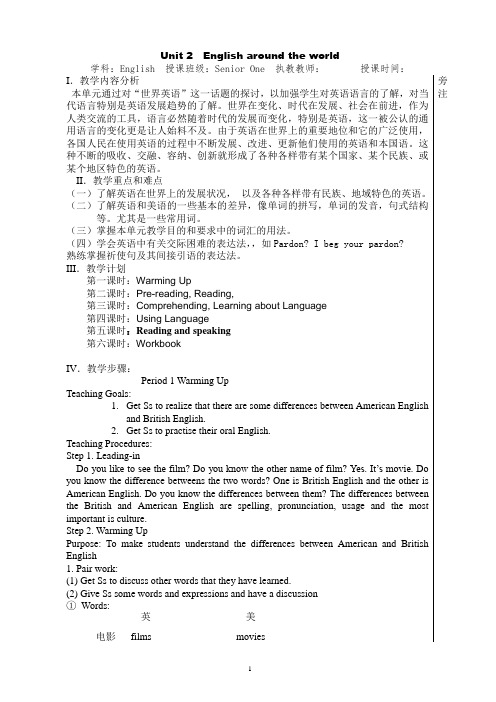
Unit 2 English around the world学科:English 授课班级:Senior One 执教教师:授课时间:I.教学内容分析本单元通过对“世界英语”这一话题的探讨,以加强学生对英语语言的了解,对当代语言特别是英语发展趋势的了解。
世界在变化、时代在发展、社会在前进,作为人类交流的工具,语言必然随着时代的发展而变化,特别是英语,这一被公认的通用语言的变化更是让人始料不及。
由于英语在世界上的重要地位和它的广泛使用,各国人民在使用英语的过程中不断发展、改进、更新他们使用的英语和本国语。
这种不断的吸收、交融、容纳、创新就形成了各种各样带有某个国家、某个民族、或某个地区特色的英语。
II.教学重点和难点(一)了解英语在世界上的发展状况,以及各种各样带有民族、地域特色的英语。
(二)了解英语和美语的一些基本的差异,像单词的拼写,单词的发音,句式结构等。
尤其是一些常用词。
(三)掌握本单元教学目的和要求中的词汇的用法。
(四)学会英语中有关交际困难的表达法,,如Pardon? I beg your pardon?熟练掌握祈使句及其间接引语的表达法。
III.教学计划第一课时:Warming Up第二课时:Pre-reading, Reading,第三课时:Comprehending, Learning about Language第四课时:Using Language第五课时:Reading and speaking第六课时:WorkbookIV.教学步骤:Period 1 Warming UpTeaching Goals:1.Get Ss to realize that there are some differences between American Englishand British English.2.Get Ss to practise their oral English.Teaching Procedures:Step 1. Leading-inDo you like to see the film? Do you know the other name of film? Yes. It’s movie. Do you know the difference betweens the two words? One is British English and the other is American English. Do you know the differences between them? The differences between the British and American English are spelling, pronunciation,usage and the most important is culture.Step 2. Warming UpPurpose: To make students understand the differences between American and British English1. Pair work:(1) Get Ss to discuss other words that they have learned.(2) Give Ss some words and expressions and have a discussion①Words:英美电影films movies 旁注汽油petrol gas, gasoline图钉drawing thumb tack钞票banknote bill跳远long jump broad jump糖果sweets candy(1)Divide Ss into groups and ask them to make a dialogue.(2)Let Ss practice the dialogue with their partners.Periods 2 Pre-reading and ReadingTeaching Goals:1.Get Ss to learn about English spoken around the world2.Improve Ss’ reading ability, especially the skills of summarizing, word guessing andscanning.3.Get Ss to realize the importance of learning English and of love of our own country.4.Encourage Ss to think and talk in English through communicative tasks and provideSs with chances of cooperation.Teaching Procedures:Step 1. Leading-inPresent Ss with the names of seven countries (the UK, the USA, Canada, Australia, South Africa, Ireland and New Zealand), and ask S s: “Is there any relationship between these 7 countries?” Allow Ss to show their own opinions. The answer is that English is the mother tongue to the people in these 7 countries.1.Present Ss with the names of some other countries: India, Pakistan, Nigeria and thePhilippines. Then ask: “Is English spoken in these countries?” Allow Ss to show their own opinions. English is used as an official language in these countries, which is spoken on formal occasions like governing, schooling and news reporting.2.Also in many countries, English is learned as a foreign language, like in China, Japan,France and so on. So although English doesn’t have the most speakers in the world, it is the most popular language all over the world. Today we’re going to read a lesson entitled English around the world.Step 2. Reading1.Skimming:Get Ss to read through the passage and find the topic sentence of each paragraph.Para 1 Today, more people speak English as their first, second or foreign language than ever before.Para 2 Native English speakers can understand each other even if they don’t speak the same kind of English.Para 3 All languages change when cultures communicate with one another.Para 4 English is also spoken as a foreign or second language in South Asia.2. ScanningPurpose: To get Ss to have some details in the text.Read the text quickly and try to get some details from the text. Work in pairs and try to ask and answer questions from the text. Questions can be like these.Q1. How many people spoke English at the end of the 16th century? Where did they live?Q2. Why is English to be spoken in many other countries in the next century?Q3. Which country has the largest number of English speakers?Q4. Why has English changed over time?Q5. Why does India have a very large number of English speakers?Suggested answers:A1. At the end of the 16th century, about five to seven million people spoke English.A2. In the next century, people from England started moving to other parts of the world,so English began to be spoken in many other countries.A3. China may have the largest number of English speakers.A4.Because all languages change when cultures communicate with one another.A5.India has a very large number of English speakers. This is because Britain ruled India from 1765 to 1947.3.Careful reading:Get Ss to read the passage carefully again and meanwhile try to guess the meaning of the following words or phrases: even if, come up, actually, play a role, vocabulary, usage, identity , government.even if=even though: in spite of the fact; no matter whetherplay a role: to be involved in an activityactually: really; in factvocabulary: all the words and phrases you learnsuch as: for exampleelevator: a machine used for moving people or things up and down4.After reading:Allow Ss to discuss with their partners the meaning of the new words. Then let some Ss explain the words. The teacher can give some further explanations if necessary.5.Answer these questions.(1) Do you think what kind of English you learn matters? Why?(2) Why do you think people all over the world want to learn English?(3) Give Ss chances to ask each other questions on the passage.6. Read the passage and choose the correct answer⑴English has /had the most speakers _______.A. now B, when the British ruled many parts of the worldC. in the time of ShakespeareD. in the 12th century .⑵Which of the following sentence is true?A Language always stay the same B. Language change only after warsC .Language no longer changeD .Language change when cultures change⑶From AD450 to 1150,English sounded more like ______.A . French B. ChineseC. GermanD. Russian⑷Shakepeare’s English was spoken around_______.A. 1400’sB. 1150’sC .450’s D. 1600’s⑸Which country has the fastest growing number of English speakers in the world ?A. Australia B ChinaC. IndiaD. BritainSuggested Answers: (1) A (2) D (3) C (4) D (5) BStep 3. Discussion1.After reading the passage, we’ve learned so much about English spoken around theworld. Do you think it’s necessary to have a good knowledge of English? Why do you think so? Please form groups of four and discuss these questions with your partners.(The teacher should walk around to provide any necessary help.)2.Give the students chances to express their opinions freely.3.Summary by the teacher:Through learning this passage, we have got to know that English is becoming more and more popular all over the world now. So English learning seems important to everyone, especially us students of the new century. With China’s entry into WTO, English will play a more important part in business, in tourism, and even in people’s daily life. So it’s no doubt that everyone should have a good knowledge of English. And I hope every one in our class can make an effort to learn English well. But on the other hand, it does n’t mean English is better than Chinese just as some students said just now. We must keep it in mind that one’s mother tongue is the most beautiful language in the world. The reason why we learn English is that we should thus be more capable of building up our country(It’s a good chance to lead the students to love our own country as well as to learn English well.)Step 4. Words and expressions1. Native English speakers can understand each other even if theydon’t speak the same kind of English .以英语作为母语的人,即使他们讲的英语不尽相同,也可以相互交流。
(完整版)高中英语人教版必修一课文内容电子版Unit2
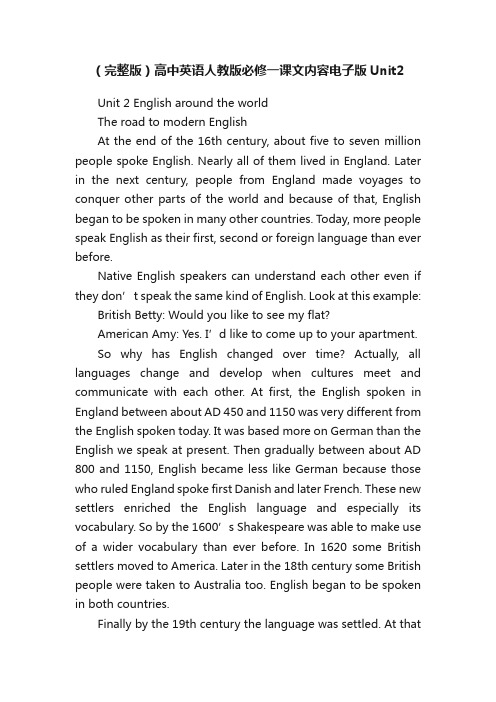
(完整版)高中英语人教版必修一课文内容电子版Unit2Unit 2 English around the worldThe road to modern EnglishAt the end of the 16th century, about five to seven million people spoke English. Nearly all of them lived in England. Later in the next century, people from England made voyages to conquer other parts of the world and because of that, English began to be spoken in many other countries. Today, more people speak English as their first, second or foreign language than ever before.Native English speakers can understand each other even if they don’t speak the same kind of English. Look at this example: British Betty: Would you like to see my flat?American Amy: Yes. I’d like to come up to your apartment.So why has English changed over time? Actually, all languages change and develop when cultures meet and communicate with each other. At first, the English spoken in England between about AD 450 and 1150 was very different from the English spoken today. It was based more on German than the English we speak at present. Then gradually between about AD 800 and 1150, English became less like German because those who ruled England spoke first Danish and later French. These new settlers enriched the English language and especially its vocabulary. So by the 1600’s Shakespeare was able to make use of a wider vocabulary than ever before. In 1620 some British settlers moved to America. Later in the 18th century some British people were taken to Australia too. English began to be spoken in both countries.Finally by the 19th century the language was settled. At thattime two big changes in English spelling happened: first Samuel Johnson wrote his dictionary and later Noah Webster wrote The America Dictionary of the English Language. The latter gave a separate identity to American English spelling.English now is also spoken as a foreign or second language in South Asia. For example, India has a very large number of fluent English speakers because Britain ruled India from 1765 to 1947. During that time English became the language for government and education. English is also spoken in Singapore and Malaysia and countries in Africa such as South Africa. Today the number of people learning English in China is increasing rapidly. In fact, China may have the largest number of English learners. Will Chinese English develop its own identity? Only time will tell.STANDARD ENGLISH AND DIALECTSWhat is standard English? Is it spoken in Britain, the US, Canada, Australia, India and New Zealand? Believe it or not, there is no such thing as standard English. This is because in the early days of radio, those who reported the news were expected to speak excellent English. However, on TV and the radio you will hear differences in the way people speak.When people use words and expressions different from “standard language”, it is called a dialect. American English has many dialects, especially the midwestern, southern, African American and Spanish dialects. Even in some parts of the USA, two people from neighboring towns speak a little differently. American English has so many dialects because people have come from all over the world.Geography also plays a part in making dialects. Some people who live in the mountains of the eastern USA speak with an olderkind of English dialect. When Americans moved from one place to another, they took their dialects with them. So people from the mountains in the southeastern USA speak with almost the same dialect as people in the northwestern USA. The USA is a large country in which many different dialects are spoken. Although many Americans move a lot, they still recognize and understand each other’s dialects.。
人教版必修一Unit2《English around the world》(the 1st period)word教案
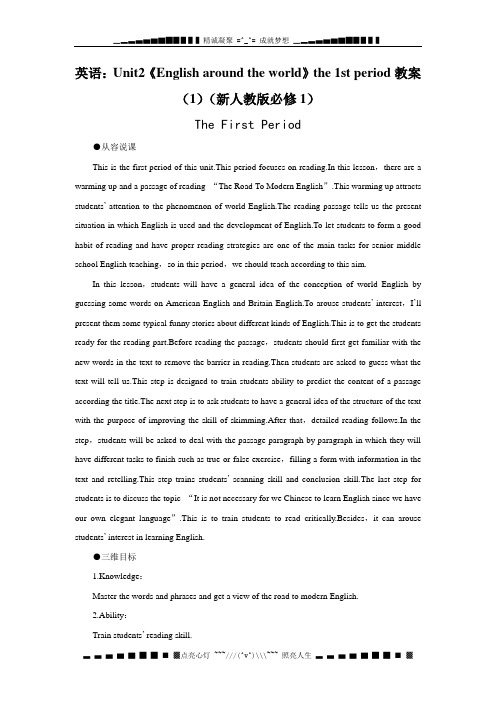
英语:Unit2《English around the world》the 1st period教案(1)(新人教版必修1)The First Period●从容说课This is the first period of this unit.This period focuses on reading.In this lesson,there are a warming up and a passage of reading “The Road To Modern English”.This warming up attracts students’ attention to the phenomenon of world English.The reading passage tells us the present situation in which English is used and the development of English.To let students to form a good habit of reading and have proper reading strategies are one of the main tasks for senior middle school English teaching,so in this period,we should teach according to this aim.In this lesson,students will have a general idea of the conception of world English by guessing some words on American English and Britain English.To arouse students’ interest,I’ll present them some typical funny stories about different kinds of English.This is to get the students ready for the reading part.Before reading the passage,students should first get familiar with the new words in the text to remove the barrier in reading.Then students are asked to guess what the text will tell us.This step is designed to train students ability to predict the content of a passage according the title.The next step is to ask students to have a general idea of the structure of the text with the purpose of improving the skill of skimming.After that,detailed reading follows.In the step,students will be asked to deal with the passage paragraph by paragraph in which they will have different tasks to finish such as true-or-false exercise,filling a form with information in the text and retelling.This step trains students’scanning skill and conclusion skill.The last step for students is to discuss the topic “It is not necessary for we Chinese to learn English since we have our own elegant language”.This is to train students to read critically.Besides,it can arouse students’ interest in learning English.●三维目标1.Knowledge:Master the words and phrases and get a view of the road to modern English.2.Ability:Train students’ reading skill.3.Emotion:Let students know more about English and inspire students to study English hard.●教学重点The understanding and comprehension of the passage.●教学难点(1)How to get to master the useful words and expressions.(2)How to improve students’ ability to read an article.●教具准备cassette recorder,some pieces of slide●教学过程Step 1 GreetingsT:Good morning,boys and girls!S:Good morning,teacher!Step 2 Warming upT:English is a widely used language.Do you know in which countries English is spoken as their native language?S a:The US,the UK,Australia,Canada...T:(a slide:Nancy:Oh,there you are.Now then,did you have a good flight?Joe:Sure,we flew all the way direct from Seattle to London.Nancy:You must be very tired.Did you sleep at all on the plane?Joe:No,not really.I’m very tired.Could I use your bathroom?Nancy:Why,of course.You don’t need to ask,just make yourself at home.Let me give you a clean towel.Joe:A towel?Nancy:Yes.Here you are.The bathroom is upstairs.It’s the second door on the left.(After a while)Nancy:Have you found it?Joe:Well,eh,yes,I mean no.I mean,I found the bathroom,but I didn’t find what I was looking for!)Here is a short dialogue.Read it and discuss with your partner:What is it that Joe can’t find inthe bathroom?Why can’t he find it?S b:It is the toilet.T:And why?S c:Perhaps when Joe says “bathroom”,he means a place,where there is a toilet.But in Nancy’s eyes,it is a place where people can only have a bath.T:You are right.Do you know why there’s a misunderstanding between them?S d:Because they speak different kinds of English.T:Great.There’s more than one kind of English in the world.In some important ways they’re different.They’re called world English.Can you guess what they include?S e:Canadian,British,American,Australian and Indian English.T:Right.So you know even two native speakers of English may still not speak the same kind of English.Look at the examples on P9.Now try to guess which of the following words are British English and which are American English.Suggested answers:Am.English:mom;on a team;rubber;gasBr.English:mum;in a team;eraser;petrolStep 3 New WordsT:From today on,we’ll learn something about English around the world.First of all,let’s get familiar with the new words.Yesterday I asked you to read the new words and look up the meaning of them.Now let’s have a game in which one of you tells us the meaning or the explanation of the words and the others guess which word it is.Let’s go!Suggested explanation:1.include:have something or somebody as one of a group.e.g.:The tour included a visit to the Science Museum.2.play a role in:have a part in3.international:connected with two or more countries4.native:(1)connected with the place where you have always lived or have lived for a long time(2)a person who lives in a particular place,especially sb. who has lived there a long time5.elevator:lift6.flat:(1)having a smooth surface (2)(Br. E)a set of rooms for living in7.apartment:(Am. E)a set of rooms for living in8.modern:of the present time or recent timee up:to move toward10.culture:the customs and beliefs,art,way of life and social organization of a particular country or group11.actually:really;in fact12.present:(1)existing or happening now (2)being in a particular place13.rule:control14.vocabulary:all the phrases and phrases you learnage:the way in which words are used in a language16.identity:who or what sb./sth. isernment:the group of people who are responsible for controlling a country or a state18.rapidly:fastT:That’s great!You’ve made a good preparation.Now please read the words together.(show words and explanations on the slide)Step 4 Pre-readingT:Just now,we’ve known that there’re many kinds of English in the world.Then why are there so many kinds?Ss:We don’t know.T:Anyway,we’ll find out the cause today.Now read the title of the passage “the road to modern English”.What do you think it will tell us?S f:I guess it will tell us the development of English.Step 5 SkimmingT:Now let’s find out whether your answer is right.So please read the passage fast in silence and find out the main idea of each paragraph.Suggested answer:Para.1:Brief introduction of the change in English.Para.2:An example of different kinds of English.Para.3:The development of English.Para.4:English spoken in some other countries.Step 6 ScanningT:You’ve mastered the structure of the passage.Now please read para.1 and 2 loud in detail.T:(several minutes later)Have you finished?Here’re some statements of which some are right while some not.Read them and then tell whether they are true or false.If false,please find out the mistake and correct it.(slides:1.Most of the English speakers in the 16th century lived in England.2.More and more people use English as their first or 2nd language.3.The US has the largest number of English speakers.4.Native English speakers can understand everything because they speak the same kind of English.)S g:The first one is true.S h:The second one is true.S i:The third one is false.China has the largest number of English speakers.S j:The fourth one is false.Native English speakers may not be able to understand everything because they do not speak the same kind of English.T:You did a very good job.Now please read para.3 after the tape.And then fill in the form on the screen.T:We know culture communication brings about changes in English.Can you think of any effect that Chinese has on English?S k:In English there are some Chinese words such as gongfu,long time no see,...T:Great!With more closely communication of culture,English is changing more frequently.T:As we all know,English is spoken as the native language mostly in western countries.Then what about English in some other parts of the world?After reading the last paragraph,would you please say something about the present situation of English in your own words?S l:It is also spoken as a foreign or 2nd language in many other countries.For example,in India,it is used for government and education.In some African and Asian countries,it is also spoken,such as in South Africa,Singapore and Malaysia.While in China,the number of English speakers is increasing fast.T:Quite good.Step 7 DiscussionT:So far,we’ve known that English is becoming more and more important in China.It has been an important subject for Chinese students.But someone say that Chinese is a much more elegant language.So it is more important for us to master it and it is not so necessary for us to master a foreign language.Do you agree with this opinion and why?Suggested answer:I don’t agree with it.With the cultural communication becoming more and more frequent,the chance to contact foreigners,exported goods,international conferences,and so on,is more and more.As the most widely used language,English is regarded as the language used in most international situations.Thus,if we want to keep up with the times,we’d better master English and use it as a tool.Step 8 Summary and homeworkT:Today we’ve learned an article on “the road to modern English”.After class,you should read it again and again to get the idea of the text further.Do the exercises of comprehending and try to tell your partner something about English in our own words.That’s all for today.Class is over.●板书设计Unit 2 English around the worldThe First PeriodNew words:Main idea of each para-graph:... ...... ...●活动与探究This activity is to make research into differences between different kinds of world English and some words from other languages in English.Divide students into two groups to do research and fill the following table in their free time.Differences Pronunciation Spelling MeaningUsage...Words from other languages Chinese Japanese French Spanish German...●备课资料Soon There Will Be No Such Thing As “Wrong”English In this article:Senior Indian journalist Gautaman Bhaskaran says that English is so flexible that one day there will be too many variations around the world.English is a victim of its own success.The other day The Times in London displayed a cartoon showing an excited schoolboy flaunting his test scores:“I done good in English.”Days later,editors of the Oxford Dictionary of English rued the spread of what they termed “greengrocer’s English”.Grammar and syntax,they regretted,were going out of fashion.Others in England—in the Oxford University Press,the BBC and so on—said the incorrect use of cliches were marring the smooth flow of a great language whose ability to imbibe and absorb has been one important reason for its success.This success also stems from the language’s unique position of being the only one spoken in most parts of the world.Really,English has no boundaries.Even in countries such as Japan and China,which were not colonized by Britain,English is making a determined “conquest”.Unfortunately,such a conquest is not always welcome because a language sometimes doubles as a political weapon.At some point it ceases to be just a means of communication and English is a classic example of this.It has always led a troubled life.It has been disliked,even hated,largely because the people who originally spoke English conquered,colonized and terrorized half the world,or just about.The animosity to the language continues,at least in some places.The bitterness that the French,for instance,have for English is a good example of a language being giving a quasi-political role in society.Fortunately,this aversion does not run as it did some years ago,and there is a growing realization that English is the lingua franca.China and Japan,among a host of other nations,have been making serious efforts to promote the language.Some months ago there was a hue and cry in Singapore over the spread of “terrible English”which the authorities called “Singlish”.“Down with it!”they said,and urged Singaporeans to learn correct English,the phenomenal flexibility of which has often made things difficult for those who have to use it every day.Today even university graduates find it hard to pen a couple of correct sentences in it.More horrifying is that many teachers and university vice-chancellors speak and write poor and ungrammatical English.Often,they are found to be out of touch with what is called “usage”and,as we all know,this is one of the pillars the language rests on.Yet,despite the mess that English is in India,the nation has—more than two centuries after Samuel Johnson wrote his English dictionary—become the hottest destination for top lexicographers.The new 10th revised edition of the Oxford Concise English Dictionary includes hundreds of Indian words.Leading the list of 600 Indian English entries are “Hindutva”(Hindu identity),“dada”(older brother),“panchayat”(local administration),“chai”(tea),“pani”(water),“puri”(a dish made of wheat)and “dosa”(rice pancake).In fact,Indian words from 20 per cent of entries and rank as the third-largest component after American and AustralianEnglish segments.Other former British colonies such as New Zealand,South Africa and the Caribbean islands follow the Indian English collection of words.English,despite its hiccups,is endearing to the common Indian man or woman.About 150 years after Lord Macaulay introduced the language in India to create “babus”(clerks)for the British bureaucracy,70 million Indians speak English,a number that is higher than that in Britain.However,there is a sneaking fear among Puritans that with this kind of spread,English may stop being English.While the French have fanatically preserved the purity of their language,the English have liberally allowed other influences to affect their lingo.So,what is seen as its strength —the fact that people all over the world understand it—can be an undermining obstacle.There might be a serious problem if every state or continent were to have its own version of English.As one writer said:“There is a risk in relentless atomization.”With too many variations of the language,a time may come when one group of English-speaking people may not be able to understand another.This is happening.Hear the way Singaporeans speak English.Listen to the Australians pronouncing “e”;it sounds like “a”.A few of the films made lately by British directors Ken Loach and Mike Leigh had to have subtitles in English.Accents in the north of Britain can be hard for people in the south to understand,let alone those outside the island.The point is,no language must be allowed such flexibility—anything goes in the name of functional communication—that people begin to take liberties with it.Ultimately,there may be no such thing as wrong English.The schoolboy in the Times cartoon was doing just that.He knew nobody would scold him for getting his English wrong.不久以后就没有“错误的”英语这一说了英语成了自身成功的牺牲品,前几天,伦敦的《泰晤士报》刊登了一幅漫画,上面画了一个兴高采烈的男学生炫耀他的考试成绩:“I done good in English”(我的英语成绩不错)。
高中英语 UNIT 2 English Around the World教案 新人教版必修1
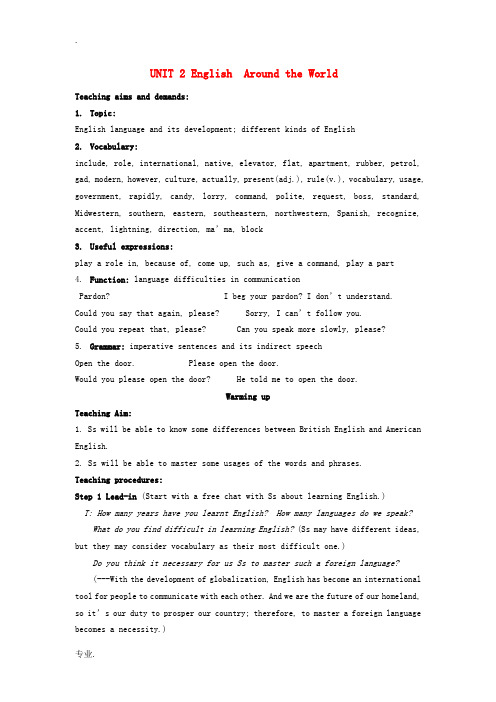
UNIT 2 English Around the WorldTeaching aims and demands:1.Topic:English language and its development; different kinds of English2.Vocabulary:include, role, international, native, elevator, flat, apartment, rubber, petrol, gad, modern, however, culture, actually, present(adj.), rule(v.), vocabulary, usage, government, rapidly, candy, lorry, command, polite, request, boss, standard, Midwestern, southern, eastern, southeastern, northwestern, Spanish, recognize, accent, lightning, direction, ma’ma, blockeful expressions:play a role in, because of, come up, such as, give a command, play a part4.Function: language difficulties in communicationPardon? I beg your pardon? I don’t understand.Could you say that again, please? S orry, I can’t follow you.Could you repeat that, please? Can you speak more slowly, please?5.Grammar: imperative sentences and its indirect speechOpen the door. Please open the door.Would you please open the door? He told me to open the door.Warming upTeaching Aim:1. Ss will be able to know some differences between British English and American English.2. Ss will be able to master some usages of the words and phrases.Teaching procedures:Step 1 Lead-in (Start with a free chat with Ss about learning English.)T: How many years have you learnt English? How many languages do we speak?What do you find difficult in learning English? (Ss may have different ideas, but they may consider vocabulary as their most difficult one.)Do you think it necessary for us Ss to master such a foreign language?(---With the development of globalization, English has become an international tool for people to communicate with each other. And we are the future of our homeland, so it’s our duty to prosper our country; therefore, to master a foreign language becomes a necessity.)In which countries is English used as the native language? Do you think the Englishes spoken all around the world are all the same ?Enjoy BBC and VOAStep 2 discussionActivity 1. Ss discuss in groups about the differences between British English and American English, and give some examples.Activity 2. Ss guess which of the following words is British English and which is American English:apartment/flat bathroom/toilet can/tin candy/sweetcheck/banknote (cheque) elevator/lift fall/autumn game/match line/queue penal /pen friend mad/angry mail/ postmom/mum movie(film)/film pants /trousers repair/mendsick/ill cookie/biscuit crazy/mad drugstore/chemist’s gas/petrolStep 3 warming upT: Now let’s enjoy a dialogue between two foreigners.T: Which language do they speak? Why do they misunderstand each other?(There exist differences between Englishes. The different Englishes make up the world Englishes.)Step 4 discussion1.Do we need to learn both British and American English?2.What kind of English would you like to learn?3.Why?Step 5 appreciationAppreciate the dialogue between Bush and BlairStep6 Homework1. Preview reading2. English weekly3. p11 ex1,2.ReadingTeaching aim:a) Ss will be able to know the development of English and feel the role that culture plays in the change of language. b) Comprehend the whole passagec) Ss will be able to know how to get the key sentence of a paragraph.Teaching procedures:Step 1 lead inAsk students several questions in the form of brain storming.1.Do you know the countries where people speak English? List them on a pieceof paper.2.What are the two main groups of English?3.Do you know the differences between British English and American English?4.Do you know the history of English?Step 2 fast readingEnglish is not only different from country to country, but also different from what it was before. Read the title “the road to modern English〞 and predict (预测) what the passage is mainly about?T: Scan the text to find or make out a key sentence for each paragraph.Let the students find out key sentence of each paragraph or ask them to summarizeStep 3. Intensive readingT: Let’s enjoy the whole passage paragraph by paragraph again. Pay special attention to the following Qs:How did old English develop into modern English?Why does English change all the way?What other Englishes developed from the old English?(1). Give the three major periods of the development of English.the end of the 16th century-------- the next century ------------ todayWho promoted the spread of English?People. When they moved, they carried English to different places.(2) T: Although they speak English, yet sometimes they can not understand each other well, why?--------- Because there exist differences between different Englishes, not only in vocabulary, but also in pronunciation and spelling. (hot/mum/honour/ honor/neighbour/neighor…..)(3) T: How do these differences come about? (Why does English change over time?)--------- Because of cultural communication.Ask ss to find out the characteristics of each time according to the time axis.AD450-1150: German 1150-1500: less like German; more like FrenchIn the 1600’s: Shakespeare’s English The time ADEL was written: American EnglishLater: Australian English(4) T: Besides the countries where English is used as a native language, where else is English used as a foreign language?---------- South Asia, India, South Africa, Singapore, Malaysia and China.Activity 1. fill in the chartActivity 2. Answer the following questions(1)What is the clue of the passage?(2) Why does India have a very number of English speakers?(3) When did people from England begin to move to other parts of the world?Activity 3: Choose the correct answers.Step 4 Post-ReadingT: From the passage we can see English is widely accepted as a native, second or third language. No wonder the number of people learning English in China is increasing rapidly. Will Chinese English become one of the world Englishes? ---------- “ Only time will tell〞.T: How do you understand this sentence?---------- It means that something can only be known in the future.T: What can you infer from this sentence about the development of English in China? --------- It indicates that it remains to be seen just how much the Chinese culture will influence the English language in the present country.Step 5. Language focus:1)even if=even though: in spite of the fact; no matter whether: He likes tohelp us even if he is very busy.2)communicate with: exchange information or conversation with other people:He learnt to use body language to communicate with deaf customers.3)actually=in fact: used when you are adding new information to what you havejust said: We’ve known for years. Actually, since we were babies.4)be based on…:5)make use of: use sth. available6)Only time will tell: to say that something can only be known in the future:Will China’s nati onal football team enter for the next finals of the World Cup? Only time will tell.Step 6 DiscussionWork in groups. Discuss the question and then ask two groups to report their answers to the class.Step 7 Homework1. Read the passage as fluently as you can.2. Find out some words and sentences you think are beautiful and recite them.3. p11.ex2.3.4Vocabulary and Useful ExpressionsWarming up1.They are called world Englishes and they include Canadian, British, American,Australian and Indian.include: v. 包括,包含e.g. The price includes service. 这个价钱包括服务费。
人教版高中英语 必修一 Unit2 《English around the world---Reading》 课件 (共28张ppt)

Can you name some countries in which English is used as an official language ?
the United Kingdom
IrelandΒιβλιοθήκη the USACanada
South Africa
Australia New Zealand
Br.E
underground
vocabulary
lift petrol flat autumn university
rubbish
holiday fortnight
Am.E
subway elevator gas apartment fall college garbage vacation two weeks
AD800----1500 By the 1600s 1620
Based more on German Influenced Danish and French
Shakespeare used a wider vocabulary British settlers moved to America
From 18th century British colonized Australia
Unit 2 English around the world
Try to find out what goes wrong in the following situation?
Go along this street and turn right at the second turning. You can see the subway on your right.
• Then the passage talking about the _s_p_r_e_a_d_(传播) of English around the world. At the end of 16th century, neary all of the English speaker lived in _E_n_g_la_n_d_.
人教新课标高中英语必修一Unit 2 English around the world课件

BritishEnglish
10
BritishEnglish
AmericanEnglish
spelling
pronunciation
colour, favourite, theatre, centre, travelled, metre
color, favorite, theater, center, traveled, meter
2.Prepareforthenextclass. 3.FinishtheexercisesonWB.
19
20
Period3Learningaboutl anguage
Unit2Englisharoun dtheworld
21
Period3:幻灯片27-48页
Revision(3m)
Match:(Reivewthenewwords)
dtous. Themonitortoldusnottoplaygamesintheclassroom. “Willyoupleasenotsmokehere?”sheadded. Sheaskedmenottosmokehere.
29
Learningusefulstructure–IV(10m)
apartment
autumn
fall
underground(地铁) subway university(大学) college
rubbish(垃圾) garbage
dustbin(垃圾箱) trashcan
holiday
vacation
fortnight(两星期)twoweeks
12
Reading–I(3m)
Paragraph2:tellsusnativespeakerscanund erstandeachotherbutnoteverything.
人教版高中英语必修一 Unit 2 English around the world PPT课件

By the 1600s
Later in the 18th century
vocabulary … were taken to Australia.
Britain ruled India …was spoken in India. The language was settled. Two dictionaries brought…
apartment movie candy elevator fall bar can subway game soccer be on vacation
Speaking Task:
Use the words above to make a dialogue to show the differences between Am. E and Br. E. Look at an example:
cheque programme
tyre
check program
tire
realise, apolze
The road to modern
English
Fast reading Which country has the fastest growing number of English learners in the world?
Part 3 Part 4
Fill in the following form about the development of English according to time order
AD450~1150
was based more on German
Between about AD 800 and 1150 At the end of the 16th century
高中英语人教版必修1《Unit 2 English around the world Section

1. Can you find the following command and
request from Reading?
command n.& vt.命令;指令;掌控 command that sb. (should) do sth.命令某人做某事 command sb. to do sth.命令某人做某事
2. 当直接引语为表示建议、提议、要求、劝告的 祈使句(或表示要求、提议、劝告、建议的疑问句) 时 , 多 用 suggest+doing/that 从 句 ( 如 suggest 后 接 that从句时, 从句使用虚拟语气should+动词原形, should也可省略), 及ask/advise/want/beg sb. +to do等结构。
*The leader said to the workers, “Don’t speak while working. ” →The leader warned the workers not to speak while working.
【名师点津】 (1)不论是否定祈使句, 还是表示委婉语气的否定疑问 句, 在变为间接引语时, 要用不定式的否定情势: not/never to do sth. 。 (2)直接引语中的称呼语变为间接引语时, 一样把它当 作主句谓语动词的宾语用。 *She said, “Don’t make so much noise, children! ” →Shetold the children not make so much noise.
③We recognize him to be a hardworking and
honest person.
_公__认__
新人教版必修一 Unit 2 English around the world全单元[教案]
![新人教版必修一 Unit 2 English around the world全单元[教案]](https://img.taocdn.com/s3/m/fef82b3d580216fc700afd84.png)
Teaching planTeaching aims:1. Get the students to learn different reading skills.2. Get the students to learn about the English language.Teaching important points:1. Develop the students reading ability and let them learn to use some reading strategies such as skimming, scanning, and so on.2.Enable the students to learn about English language and know different kinds of English so as to communicate with people from different countries.Teaching difficult points:Develop the students’ readi ng ability.Teaching methods :Task-based teaching and learningUnit 2English around the world知识目标:本单元需要学习的重点单词为:include role international native elevator flat apartment rubber petrol gas modern culture AD actually present(adj. )rule(v. ) vocabulary usage identity government Singapore Malaysia rapidly phrase candy lorry command request retell polite boss standard Midwestern southern Spanish eastern southeastern northwestern recognize accent lightning direction ma’am subway block本单元需要学习的重点词组为:play a role in because of come up such as play a part(in) 本单元需要学习的重点句型为:1. World English comes from those countries, where English plays an important role as a first or second language, either because of foreign rule or because of its special role as an international language. (the Attributive Clause; either. . . or. . . )2. Native English speakers can understand each other even if they don’t speak the same kind of English. (even if. . . )3. It became less like German, and more like French because those who ruled England at that time spoke French. (those who. . . )4. Today the number of people learning English in China is increasing rapidly. (the number of+ n. 作主语时,谓语动词用单数形式)5. Believe it or not, there is no such a thing as standard English. (Believe it or not, . . . )6. The US is a large country in which many different dialects are spoken. (the Attributive Clause)7. In fact, an English dictionary like the kind you use today wasn’t made until the time of the Qing Dynasty. (the Attributive Clause; not. . . until. . . )8. These men spent nearly all of their lives trying to collect words for their dictionaries. (spend. . . in doing sth. )9. At the age of fourteen, he left his village school in Scotland and taught himself while working ina bank. (while doing. . . )10. We know that languages develop and change over time and that is why we have new dictionaries from time to time. (that is why. . . )本单元需要掌握的交际功能用语为:语言交际困难(Difficulties in language communication) Pardon?I beg your pardon?I don’t understand.Could you say that again please?Sorry, I can’t follow you.Could you repeat that, please?Could you speak more slowly, please?How do you spell it, please?本单元需要掌握的语法为:祈使句及其间接引语(the imperative sentence and its indirect speech)1. 要求或命令(demands or orders)“Open the door, ” told he.→He told/ordered me to open the door.2. 请求(requests)He said, “Please open the door. /Would you please open the door? ”→He asked me to open the door.能力目标:1. 能运用所学语言知识谈论有关“世界英语”方面的话题。
人教版高中英语必修一unit2_English_around_the_world_全单元课件

eraser gas apartment elevator honour colour movies subway
Nowlet’scometoreadin g
TheroadtomodernEnglish
Predict(预测):
Readthetitle“Theroadtomoder nEnglish”andpredict(预 测)whatthepassageismainlyabo ut?
Readthetextagain,doth eEx.1inPage10 Ifit’sfalse,correctit.
Afterthe17thcentury,morepeoplebeganto SpeakEnglish.
1.Englishhadthemostspeakers inthe17thcentury.
11.__________andChina. India Singapore SouthAfrica
Malaysia
1.becauseof+名词/代词 因为,由于 because+句子
Hepassedtheexam____b_e_c_a_u_s_e_o_f _hishardwork. Iwentbacknot_____b_e_c_a_u_s_e_otfherain,but __b_e_c_a_u_s_e__Iwastired.
WhenyouheartwonativespeakersofE nglish,theymaystillnotspeakthesa mekindofEnglish.
DoyouknowthedifferencebetweenB r.EandAm.E?
Doyouhavean yplanthisfall?
人教版高中英语 必修一 Unit2 《English around the world---Reading》 课件 (共27张ppt)
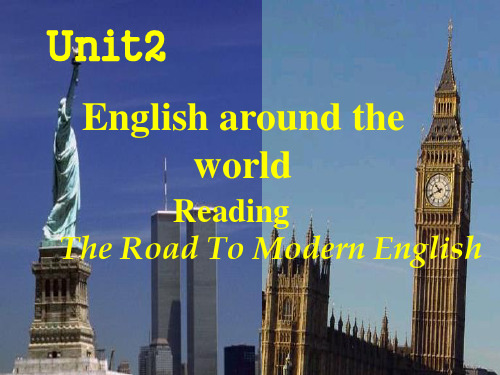
Para 5 1 English is one of the official languages used in India.
2 During 1765 and 1947, English became the language for_g_o_v_e_r_n_m__en_t__a_n_d_e_d_u__ca_t_i_o.n
Br E
football
Am E
soccer
Br E
lift
Am E
elevator
Br E
flat
Am E
apartment
Read Para 3 and answer the question
Why does English change over time? Because of cultural communication.
Para 4
Ture or false? • Noah Webster wrote The American
Dictionary of the English Language.
F • Samuel Johnson wrote his dictionary and gave a seperate identity to American English spelling.
3 ____ will tell if Chinese English develop its own identity. A time B people
Thinking
Will Chinese English become one of the world Englishes?
“Only time will tell”.
Noah Webster Born: October 16, 1758 Died: May 28, 1843 When Noah was 43, he started writing the first American dictionary. He did this because Americans in different parts of the country spelled, pronounced and used words differently.
人教版高一英语必修一unit2 English around the world 全单元课件(共85张)
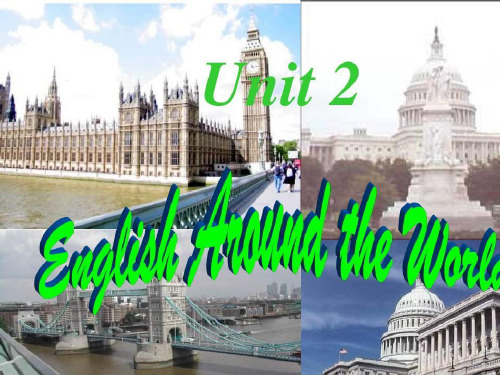
come about 出现,发生 note come across 偶然遇到或找到 come around 恢复; 还原; 改变某人的 意见或立场 come down 传承; 按习惯通过或处理 come out 成为众所周知; 发行或发表; 结果; 自己公开宣布 come over 过来; 偶然拜访 come up with 宣布或发现
Percentage of English speakers by country
Canada the UK
the USA India Singapore Australia South Africa
… New Zealand
Can you name some English-speaking countries?
2. The sea was calm at the beginning of our ______(航行).
voyage
3. The new couple finally moved into a new apartment ________(公寓). 4. He adds words to thevocabulary __________(词汇表) from
6. make (good/full/no…) use of (好好/充分/不)利用, 使用
我们应该好好利用我们的时间去努力学习。
We should make good use of our time to study hard.
7. latter adj. 较后的;后半的;(两者中)后者的
辨析:
command n.&vt. 命令,指令;掌握 拓展: Have a good command of 掌握;精通(尤
Unit2 English around the world (人教版新课标)解析版

“地毯式过单词”(人教版新课标)必修一Unit2 English around the world一、单词拼写(根据汉语或首字母提示写出单词的完全形式)1.I made friends with the (当地人),and they were concerned about me.【答案】natives【句意】我和当地人交朋友,他们都很关心我。
2.I paid a visit to Russia which is rich in natural resources and the travel(使丰富) my horizons.【答案】enriched【句意】我参观了资源丰富的俄罗斯,这次旅行丰富了我的视野。
st week some city o suggested the city might be interested in turning the old theater intoa museum and public meeting place.【答案】officials【句意】上周一些官员表态城市公众可能对把老剧院改造成博物馆和会议室感兴趣。
4.The ship will start its maiden (航行) next Monday,which makes me unable to keep calm.【答案】voyage【句意】下周一这艘船将开始它的第一次航行,这使我激动不已。
5.If you set down just one more new word each day,in the next year you will increase yourv by more than 300 words.【答案】vocabulary【句意】如果你每天记下一个单词,明年你就学会三百多个。
6.As you know,bamboo always stands s ,so it represents “noble”and “strong-willed”.【答案】straight【句意】正如你所了解的,竹子笔直代表着高贵与意志坚强。
人教版高中英语必修1《Unit 2 English around the world》教案
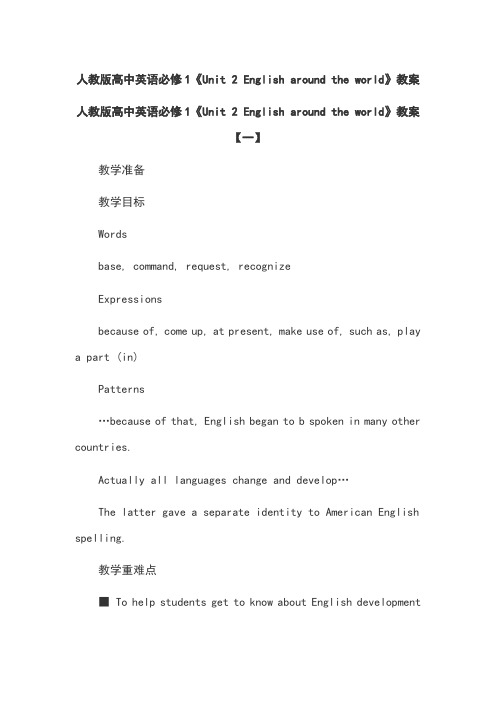
人教版高中英语必修1《Unit 2 English around the world》教案人教版高中英语必修1《Unit 2 English around the world》教案【一】教学准备教学目标Wordsbase, command, request, recognizeExpressionsbecause of, come up, at present, make use of, such as, play a part (in)Patterns…because of that, English began to b spoken in many other countries.Actually all languages change and develop…The latter gave a separate identity to American English spelling.教学重难点■ To help students get to know about English development■ To help students better understand “learning English”■ To help students understand and use some important words and expressions■ To help students identify examples of Indirect Speech (II): request & commands in the text教学工具课件教学过程⑴Warming up by listingGood morning, class. We have been learning English for several years. But how many English-speaking countries are there in the world? Now let’s make a list of them on the blackboard.English Countries ExplanationMother tongue the United Kingdomthe United States of AmericaCanadaAustraliaSouth AfricaIrelandNew Zealand The people in these countries are native speakers of English. In total, for more than 375 million people English is their mother tongue.Second language IndiaPakistanNigeriathe Philippines These people speak the language of their own country at home but the language of the government, schools, newspapers, and TV is English.Foreign language ChinaGermanyFranceetc. The number of people who learn English as a foreign language is more than 750 million.⑵Warming up by answering questions about EnglishGood morning, class. Today we shall start learning Unit 2 English around the world. But how much do you know about English?●What is Standard English?Standard English is the form of English that most people in Britain use, and that is not limited to one area or group of people.●What is a dialect?A dialect is a variety of a language spoken only in one area, in which words, or grammar are slightly different from other forms of the same language.●Do we have standard Chinese? What is it?In China there’re so many dialects that the government encourages the whole nation to speak Putonghua, which is regarded as standard Chinese.⑶Warming up by giving reasonsUnit 2 English around the world is what we are going to learn today. We are all learning English now because English is so popular in the world. But do you know why it is so? How many reasons could you giving for the spread of English around the world?* English is one of the official languages of the Olympic Games and the United Nations.* English dominates international websites and provides nearly all of the new computer terminology.* Tourism and trade from Western Europe and North America has contributed to the spread of English.* Satellite TV, radio programs like Joy FM, CDs and, of course, Hollywood films all broadcast English into China. Also,a number of Chinese films include English subtitles.2.Pre-readingWe are learning English here. But why are we learning it? Could you suggest to the class as many reasons as you can think of, why people in the world learn English?for work, as a hobby, to learn about other people, to travel, to read literature in the original, to read research papers, to meet foreigners, to surf the Internet, to pass exams, etc.Go on with your reasons. I shall write your suggestions on the board as you make them.3. Skimming the text for general ideasNow we go to page 9 to skim the text for the main idea of each paragraph.Paragraph 1: The spread of the English language in the worldParagraph 2: Native speaker can understand each other even if they don’t speak the same kind of English.Paragraph 3: English changes and develops when cultures meet and communicate with each other.Paragraph 4: By the 19th century English is settled.Paragraph 5: English is spoken as a foreign language or second language in South Asia.4. Reading and fillingRead the text to complete the chart below.Time English is influenced by…AD 450-1150 German1150-1500 FrenchIn the 1600’s Shakespeare, who make use of a wider vocabulary than ever beforeBy the 19th century Samuel Johnson, Noah WebsterNow Languages in South Asia, in Singapore, in Malaysia, in Africa and in China5. Reading and copyingNext we shall go over the text once more. This time try find and copy all the useful expressions down in your notebook.Useful expressionsat the end of…, make voyages, speak English as…, in the next century, change over time, communicate with…, be based on…, at present, become less like…, rule England, enrich the English language, make use of…, move to…, later in the 18th century, give a separate identity to…, have a very large number of…, fluent English speakers, become the language for…, develop one’s own identity, increase rapidly人教版高中英语必修1《Unit 2 English around the world》教案【二】教学准备教学目标Teaching aims:1) Get the students to master some important words, phrases and sentence patterns.2) Enable the students to use the language points by themselves.教学重难点Teaching important points:Master the usages of “more than , come up, over, be based on, present, a/ the number of”Teaching difficult points:present: v adj教学工具课件教学过程1 Do you know that there is more than one kind of English?more than one 不止一个eg:More than one girl in this school holds such a view.more than one 后跟___________,作主语时,谓语动词要用______。
高中英语人教版必修一Unit2Englisharoundtheworld课文知识点详解课件

Ⅰ.高频单词思忆
1.He stopped in front of the mirror to put his tie straight .
2.She went on a long sea v oyage . 3.After a few years,she was sent back to her
(1)作主语的疑问代词+do you think/believe/ suppose/imagine/guess/say/consider/suggest+ 谓语+其他。
(2)不作主语的疑问词+do you think/believe/ suppose/imagine/guess/say/consider/suggest+ 主语+谓语+其他。
Everyone recognized him to be a lawful heir of the money. 大家都承认他是那笔钱的合法继承人。 归纳总结 recognize v.辨认出;承认。 (1)recognize sb./sth.by/from...根据……认出 某人/某事(物) be recognized to be/as...被认作……/被认为 是…… It is recognized that...人们公认…… (2)recognition n.认识;认出 out of/beyond recognition认不出来
Ⅲ.典型句式运用
1.Native English speakers can understand each other even if they don’t speak the same kind of English.以英语为母语的人,即使所讲 的英语种类不尽相同,他们也可以互相理解。 考点提炼 本句中的even if相当于 even though , 意为“ 即使,尽管”,引导让步状语从句。even if/though所引导的让步状语从句可用现在时代替 将来时。
人教版高一Unit2Englisharoundtheworld要点讲解
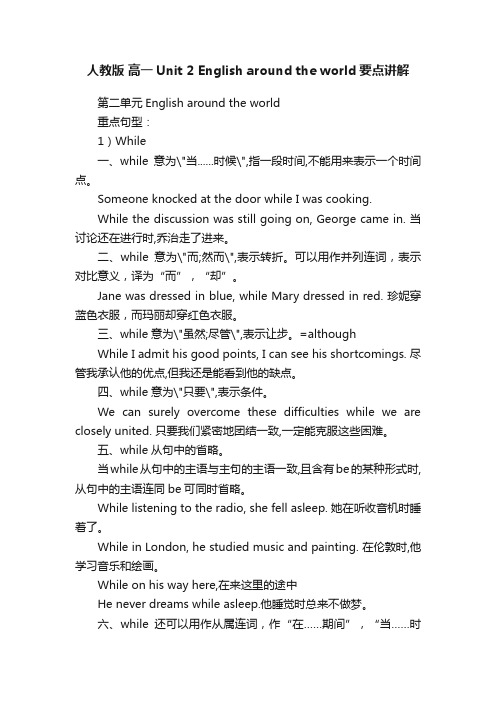
人教版高一Unit 2 English around the world要点讲解第二单元English around the world重点句型:1)While一、while意为\"当......时候\",指一段时间,不能用来表示一个时间点。
Someone knocked at the door while I was cooking.While the discussion was still going on, George came in. 当讨论还在进行时,乔治走了进来。
二、while意为\"而;然而\",表示转折。
可以用作并列连词,表示对比意义,译为“而”,“却”。
Jane was dressed in blue, while Mary dressed in red. 珍妮穿蓝色衣服,而玛丽却穿红色衣服。
三、while意为\"虽然;尽管\",表示让步。
=althoughWhile I admit his good points, I can see his shortcomings. 尽管我承认他的优点,但我还是能看到他的缺点。
四、while意为\"只要\",表示条件。
We can surely overcome these difficulties while we are closely united. 只要我们紧密地团结一致,一定能克服这些困难。
五、while从句中的省略。
当while从句中的主语与主句的主语一致,且含有be的某种形式时,从句中的主语连同be可同时省略。
While listening to the radio, she fell asleep. 她在听收音机时睡着了。
While in London, he studied music and painting. 在伦敦时,他学习音乐和绘画。
人教高中英语必修一:Unit2 English around the world 课件
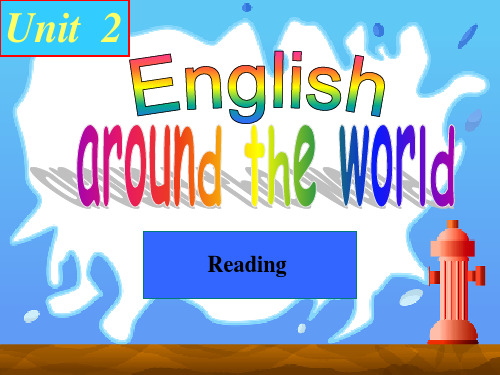
1. 官方的,正式的 2. 航行,航海 3. 本国的,本地人 4. 电梯 5. 公寓住宅 6.汽油 7. 走进,提出 8. 以……为根据 9. 目前 10. 逐渐的 11. 莎士比亚 12. 词汇 13. 本身,身份 14. 实际上 15. 例如…… 16. 较后的 17. 流利的 18. 频繁的
Task 1: Fast reading
everything. English is changing over time.
Para 3
More and more people speak English.
Para 4
English is spoken as a foreign or second language in many countries
Find out the main ideas of each paragraph
Match the main ideas of each paragraph :
Para 1
Native English speakers can understand each other but not
Para 2
Para 5
The two big changes happened in English spelling.
Task 2: Careful reading
Para.3-4
AD450--1150
English was based on __G_e_r_m_a_n
AD800--1150
By the 1600’s
_D_a_n_is_h__and_F_r_e_n_ch____settlers
enriched the English language. Shakespeare made use of a wider vocabulary.
- 1、下载文档前请自行甄别文档内容的完整性,平台不提供额外的编辑、内容补充、找答案等附加服务。
- 2、"仅部分预览"的文档,不可在线预览部分如存在完整性等问题,可反馈申请退款(可完整预览的文档不适用该条件!)。
- 3、如文档侵犯您的权益,请联系客服反馈,我们会尽快为您处理(人工客服工作时间:9:00-18:30)。
高中英语学习材料
madeofjingetieji
句式翻译
第Ⅰ组
1.不止一个人在交通事故中丧生。
(more than)
2.尽管在聚会上我谁也不认识,但仍然玩得很开心。
(even if)
3.以真实的故事为基础,这本书目前很流行。
(base)
4.我们正在多方面利用太阳能。
(use)
5.这个问题是怎么产生的?(come)
6.因为污染严重,许多美丽的鱼类正在面临绝种。
(because of)
7.信不信由你,明天的考试被取消了。
(believe)
8.我相信雅虎未来将继续扮演互联网领先者的角色。
(role)
9.我不喜欢你处理这个问题的方式。
(way)
10.只要努力,你会成功的。
(as long as)
答案:
1.More than one (person) was killed in the traffic accident.
2.Even if I didn’t know anybody at the party,I had a good time.
3.Based on a real story,the book is popular at present.
4.We are making use of energy from the sun in many ways.
5.How did the problem come up?
6.Many beautiful fish are fast disappearing because of the severe pollution.
7.Believe it or not,the examination tomorrow is called off.
8.I believe that Yahoo will continue to play the leading role of the Internet.
9.I don’t like the way you deal with the matter.
10.You will succeed as long as you work hard.
第Ⅱ组
1.由于天气不好,他开会迟到了。
(because of)
2.应该充分利用这本书。
(use)
3.信不信由你,中国足球队被泰国队打败了。
(believe)
4.老师建议我们用其他方法再做一遍。
(间接引语)
5.该影片是根据张爱玲的一部小说改编的。
(base)
6.现在我想不出更多的主意了。
(come)
7.目前很多人要动身去机场。
(present)
8.地理在我们的日常生活中扮演重要角色。
(role)
9.这家商店里有跟那本杂志上描述的类似的一些机器。
(those)
10.学校要求男生不要留长发。
(request)
答案:
1.He was late for the meeting because of the bad weather.
2.This book should be made full use of.
3.Believe it or not,the Chinese football team was beaten by the Thailand team.
4.The teacher advised that we do it again in another way.
5.The film is based on a novel by Zhang Ailing.
6.I can’t come up with any more ideas right now.
7.At present,a large number of people are leaving for the airport.
8.Geography plays an important role in our daily life.
9.The machines in this shop are similar to those described in the magazine.
10.The school requests the boy students not to wear long hair.
第Ⅲ组
1.西湖之美令人难以描述。
(more than)
2.美国英语以英国英语为基础。
(be based on)
3.信不信由你,美国英语现在比以往任何时候起的作用都重要。
(play a part)
4.目前,很多人因为想实现美国梦而学习美国英语。
(at present,because of)
5.李华认识到了美国英语的重要性,成了学习美国英语的一员。
(recognize)
6.李华说他会不断努力,即使困难重重,也不会放弃。
(frequent,come up)
7.他充分利用时间,丰富词汇,练习听说。
(make use of)
8.我相信他一定能掌握美国英语。
(have a good command of)
9.经理要求她说话时摆脱浓重的南方口音。
(request)
10.即使失败,我也不灰心。
(even if)
答案:
1.The beauty of the West Lake is more than one can describe.
2.American English is based on British English.
3.Believe it or not,American English is playing a more important part than ever before.
4.At present,many people take up American English because of trying to achieve their American dreams.
5.Li Hua has recognized the importance of (learning) American English and become one of those learning American English.
6.Li Hua says that he’ll make frequent efforts and won’t give up even if many difficulties may come up.
7.He makes full use of his time to enrich vocabulary and practice listening and speaking.
8.I believe he’ll have a good command of American English.
9.Her manager requests her to get rid of her strong southern accent when talking.
10.I wouldn’t lose heart even if I should fail.。
